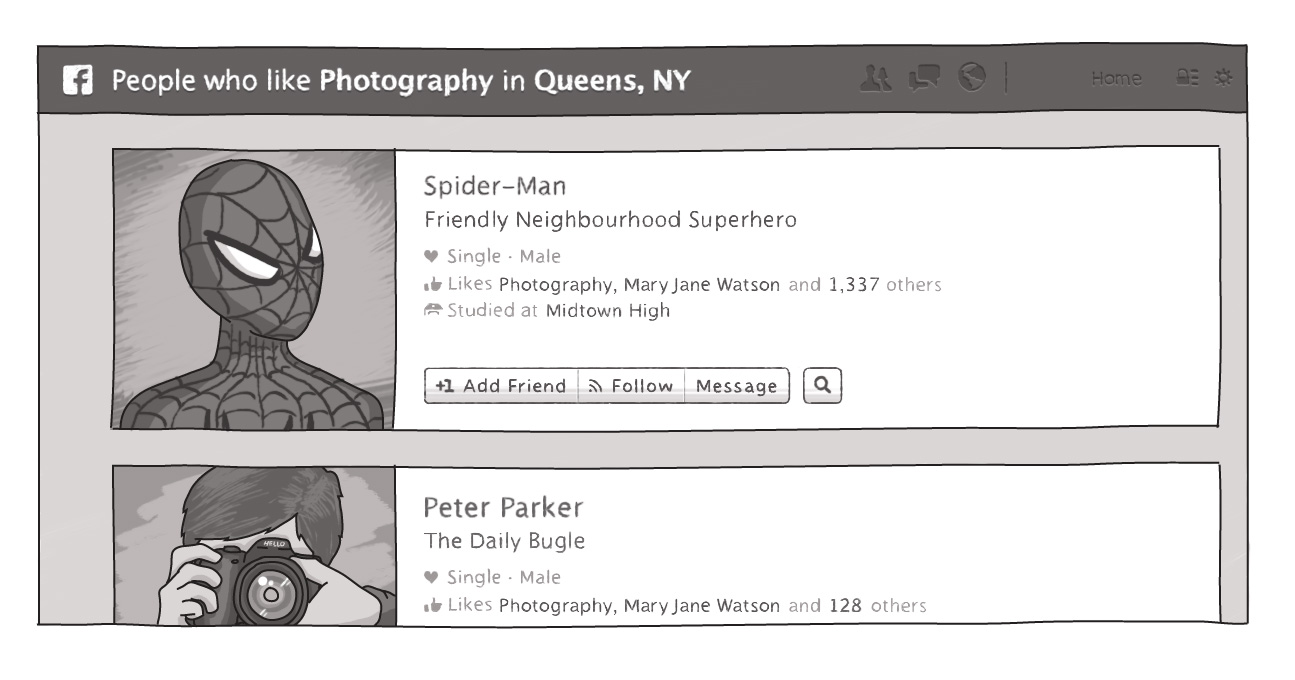On Facebook You Are What You Liked

Remember that oh-so-ironic like you posted two years ago on Facebook? You may not, but Facebook Graph Search certainly will. As a result, will users and businesses change the way they interact with the social network?
For both individuals and businesses, the advent of Facebook’s Graph Search is a huge opportunity to take advantage of high-quality, relevant content. But, to quote Spider-Man’s Uncle Ben, “With great power comes great responsibility.”
Personally, I have absolutely no problem with Facebook mining my data for search and advertising purposes. The point those raising various hues and cries about privacy often miss is that Facebook isn’t free. We pay for this so-called free service with our data.
The onus is on each of us to ensure that we're bartering with the right coin.
At its base level, the new Facebook search, which is still in Beta, enables you to receive customized referrals to questions you ask based upon your friends’ activity, likes, and publicly available information.
But any search functionality is only as good as its users. If you don’t update your likes, you’re providing an outdated frame of reference -- and you can run the risk of (at least, in some cases, I hope that it's so) misrepresenting yourself through your likes.
There was a time when I thought Father Abraham in Smurfland was what music was all about; I later believed The Return of Bruno was an example of good blues. That’s, thankfully, no longer the case (although Smurfing Beer is a highly underrated song – and would never see the light of day in today’s parenting environment).
We all grow up. We all change. Our likes and tastes evolve, so it's up to all of us to ensure that our profiles accurately reflect who we are. However, will this new application of improve the value of likes? Or will it render them completely insignificant.
I’ll admit it, I’ve never been overly attentive to my likes. I balance that by being pretty parsimonious about doling them out in the first place, but over the yearssometimes I’ve ‘liked’ pages as a learning opportunity – to experience a contest, content page, or information source that was hidden behind a like. It's part of the job. Usually I delete them; but sometimes I don’t.
And anyone who has a teenager (or knows of one), has likely experienced the "fake like." It's usually born of someone walking away from his or her Facebook profile, leaving it at the mercy (and mockery) of the user's friends.
For people with hundreds upon thousands of likes, this could pose a problem. Those "joke" likes may not be so funny once taken out of context in a search application.
So how do you fix it? Go through your likes and ‘unlike’ those items to which you no longer relate; but also get to know your Activity Log. To ensure that all those former ‘likes’ don’t come back to haunt you in search, delete or hide the references from your Timeline.
For graph search to have relevancy, those likes need to be genuine, current, and honest. Flooding the system with fake or out-of-date likes will neuter the search functionality right out of the box. And this will represent a change in attitude for Facebook's users -- initially the like was passive in nature, allowing you to receive content through a subscription of sorts, without actively going to a particular page. Now, thanks to graph search, Facebook is expecting users to be more active in defining -- and maintaining -- their profiles, likes, and tags.
The move to Graph Search actually reminds me of my LookSmart Canada days (before it moved to PPC and search advertising). There, we were tasked with creating a user-defined search network -- we were guaranteeing the quality of the search results by having a team of editors pick and choose the best of the Web. We wanted to be a user-curated AltaVista/Yahoo (we were pre-Google dominance). Obviously, it was not a sustainable business model: I led a team of about a dozen Web editors, tasked with finding a certain number of sites per day, based upon content demand.
The idea was good; the execution was lacking. We just couldn't generate the critical mass we needed to make it work -- and that was in the early days of the World Wide Web. Searchers love peer-reviewed sites -- it adds a level of trust, which is only augmented by these tacit endorsements by your friends, family, and acquaintances. Using the power of Facebook's user base, the peer-review network is vastly increased. It has the critical mass, so it has the potential to be great.
If users get behind it.
And will this change user behaviour in the future? Will users actually take more care with the likes they give out? Will they think twice about liking a so-called guilty pleasure (think, oh, Wilson Phillips' songs), knowing that their name will be attached to it through search? From a corporate marketing perspective, will people be more reluctant to engage in "forced" likes knowing that they're paying for access to your content with a public endorsement?
For businesses, those likes become even more valuable. And the content you provide -- both on your Facebook page and in your descriptions -- must be accurate. If you're a Lebanese restaurant in London, Ontario, you better make sure that shows up. A little Facebook SEO will be called for.
I'd love to read your thoughts. Does the fact that your likes power Facebook's graph search mean you'll be changing your behaviour? Will you edit your existing likes? Have you done it already? Share your thoughts in the comment section below.
What will Facebook graph search do?
What do Facebook likes mean?
How do I delete a like on Facebook?
SUBSCRIBE TO OUR E-NEWSLETTER
 Subscribe
Subscribe


